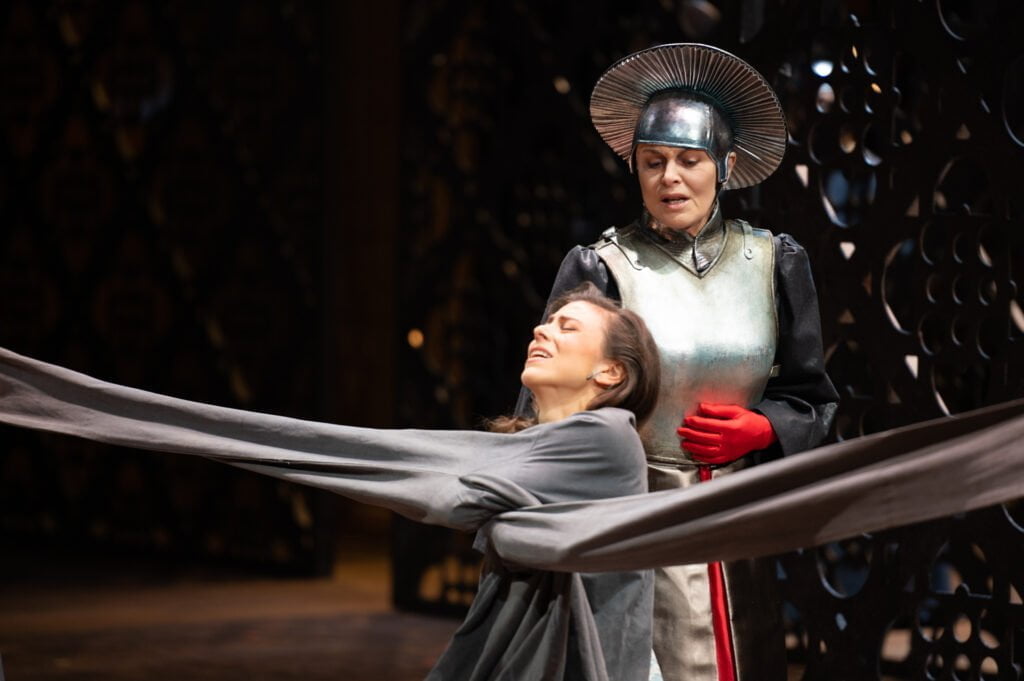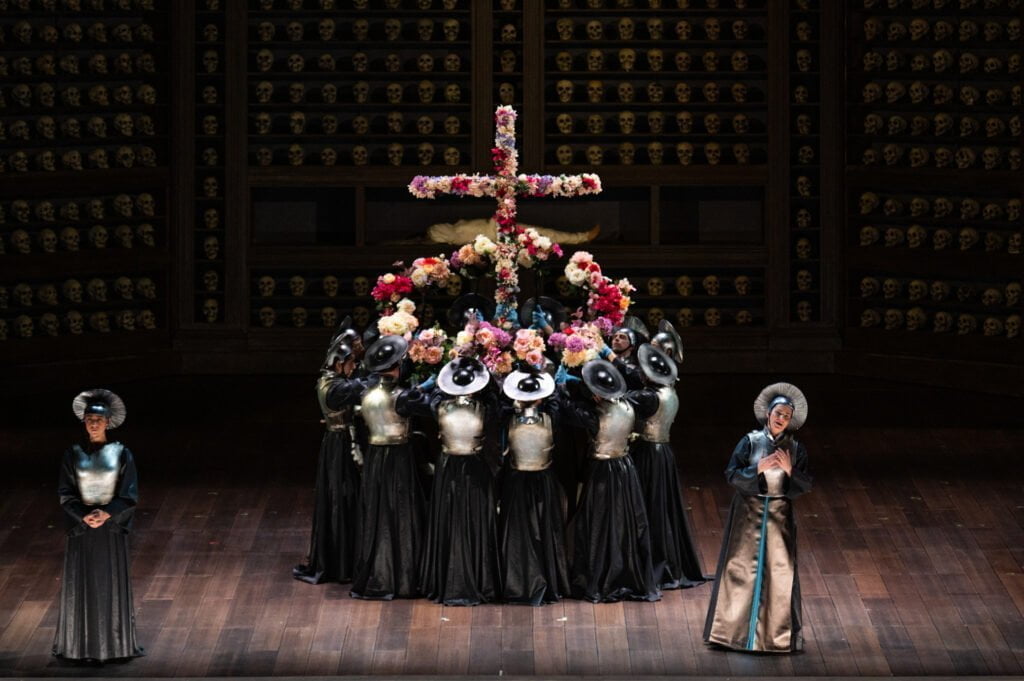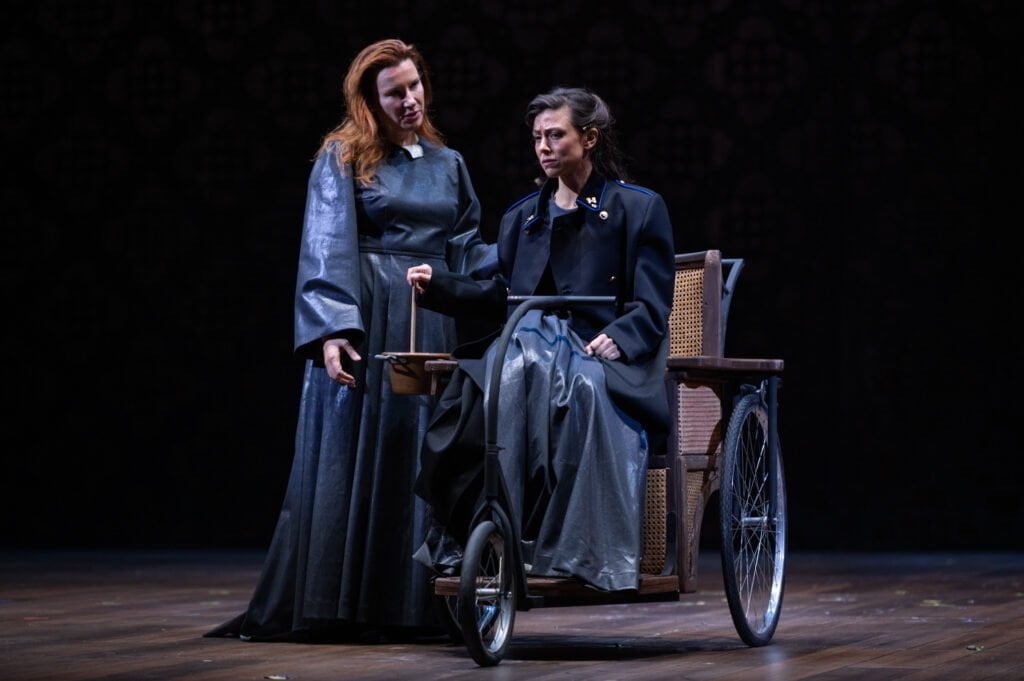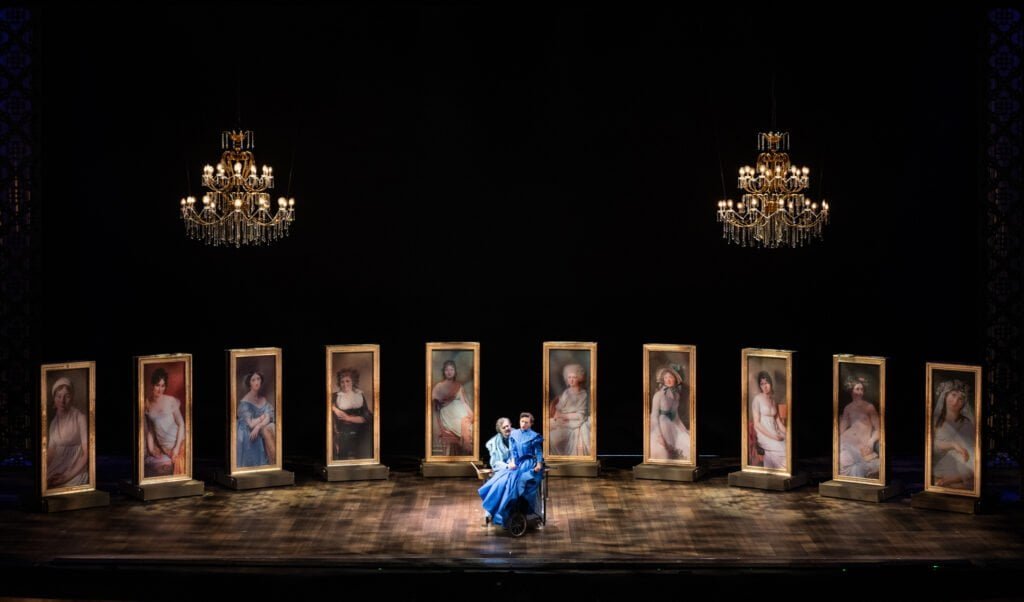Dialogues des Carmélites
From November 27th to 6th December 2022, the Opera Theatre in Rome presents Poulenc’s Dialogues des Carmelites, conducted by Michele Mariotti, directed by Emma Dante. Attended performance: 02-12-2022.
MARQUIS DE LA FORCE (Baritone) Jean-François Lapointe
BLANCHE DE LA FORCE (Soprano) Corinne Winters
CHEVALIER DE LA FORCE (Tenor) Bogdan Volkov
MADAME DE CROISSY (Alto) Anna Caterina Antonacci
MADAME LIDOINE (Soprano) Ewa Vesin
MÈRE MARIE DE L’INCARNATION (Soprano) Ekaterina Gubanova
SOEUR CONSTANCE DE SAINT-DENIS (Soprano) Emöke Baráth
MÈRE JEANNE DE L’ENFANT-JÉSUS (Alto) Irene Savignano
SOEUR MATHILDE (Soprano) Sara Rocchi
L’AUMÔNIER DU CARMEL (Tenor) Krystian Adam
OFFICIER (Baritone) Roberto Accurso
I COMMISSAIRE (Basso) William Morgan
LE GEÔLIER / II COMMISSAIRE (Baritone) Alessio Verna
THIERRY /JAVELINOT (Baritone) Andrii Ganchuk
Music: 5*****
Staging: 3***
The opening of the season represents for each Opera House the moment of maximum visibility, and is therefore generally associated with titles guaranteed to attract attention. Courageously, the Teatro dell’Opera di Roma scheduled an opera that is certainly not among the most popular ones, at least in comparison with many other titles, which are better known and more often represented.
Poulenc’s masterpiece, while remaining one of the most important works of the second half of the 1900s, was accused of being reactionary, both on account of the subject matter (the explicit condemnation of the French Revolution) and the music itself, which is a far cry from the extreme experimentation that characterized that period. And that explains why his music did not get the exposure it deserved. The choice of the Rome Opera is therefore particularly significant, with a view to extending the operatic horizon beyond a repertoire that otherwise risks becoming increasingly reductive.
Poulenc’s music provides us with various reference models: first of all, Debussy, but also Mussorgsky, and ancient sacred music. Maestro Michele Mariotti masters Poulenc’s complex score with great confidence, enhancing the contrasts and tonal nuances of the rich orchestra, in which we find, among other things, a piano, an organ and numerous percussions. The emphasis placed on pauses and silences (above all those in the work’s magnificent finale) appeared to be particularly effective. Excellent as always was the performance of the orchestra of the Rome opera.

As far as the cast is concerned, protagonist Corinne Winters plays the fragile Blanche beautifully. The role doesn’t involve special technical difficulties, but it certainly requires a great sensitivity that the American soprano undoubtedly possesses. In addition to the undisputed ability to adequately calibrate the voice both in impetuous moments and in moments of prayer in pianissimo, the singer also demonstrates excellent acting skills, thus giving the character a complete interpretation.
Anna Caterina Antonacci plays Madame De Croissy, the prioress of the Carmelites who will die from the terror of death itself. Although the role is for contralto, her performance, too, was excellent both from a vocal and (perhaps above all) scenic point of view. The finale of the first act is certainly one of the most engaging moments of the entire opera, and the Italian singer did not disappoint.
The Polish soprano Ewa Vesin is Madame Lidoine, bound to become the new prioress. A singer with a powerful voice, she offers an excellent performance. For example, we recall her monologue at the beginning of the third scene of the third act (“Mes filles,…”).


The Russian soprano Ekaterina Gubanova plays Mère marie de L’Incarnation. Her resonant voice seemed ideal to represent the severe and austere Carmelite.
The vivacious Soeur Constance is brilliantly portrayed by Emöke Baráth. Thanks to her vocal and acting skills, the Hungarian soprano gives life to the brightest character in the opera, making it fully credible.
The Ukrainian tenor Bogdan Volkov plays a delicate Chevalier De La Force, with a deliberately subsided voice, at times almost whispered, while the convent chaplain is entrusted to the Polish tenor Krystian Adam, at ease in the role.
Baritone Jean-François Lapointe plays the Marquis De La Force. His brief appearance, limited to the first scene of the first act, is excellently rendered.
The other singers are also good in their short but intense roles, from Irene Savignano to Sara Rocchi, Roberto Accurso, William Morgan, Alessio Verna and Andrii Ganchuk.
Remarkable, as always, was the performance of the choir of the Teatro dell’Opera di Roma directed by Ciro Visco, and on this occasion predominantly female as required by the libretto.

Acceptable direction
All in all, Emma Dante‘s direction is acceptable. She limits herself to following the story without trying to force the libretto in search of extravagant readings. While the idea of the “paintings” – the portraits of the nuns that enliven the various scenes, finally acting as stylized guillotines in the finale – may not be particularly original, the result is nonetheless effective. On the other hand, the director introduced some extraneous elements, particularly in the shape of a group of mimes/dancers omnipresent on stage, choreographed by Sandro Campagna, probably with the (useless) aim of enlivening the generally rather static action. Their presence was especially intrusive during the numerous orchestral interludes, sadly disturbed by out-of-place pantomimes (among which a ridiculous circle of nuns on bicycles), not to mention the use of dancers made up as Carmelites, which seemed equally out of place.
The costumes by Vanessa Sannino appeared very beautiful, even if out of place at times (nuns wearing armor springs to mind), and the sparse but suggestive scenes by Carmine Maringola were effective, embellished by the excellent play of lights curated by Cristian Zucaro. In the end, the proposal from the Teatro dell’Opera proved to be successful and attracted a large audience, which gave the entire cast a well-deserved applause.
